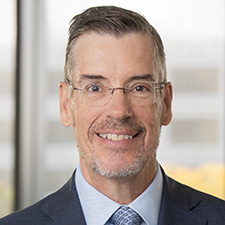A few days after being discharged from a skilled nursing facility, a palliative care patient in Southeast Michigan and his spouse found themselves overwhelmed and unprepared. They didn’t have home health care services set up, and they were running out of critical medical supplies.
That’s when they received a call from a postacute care manager from Populance—a population health service company affiliated with Henry Ford Health. The patient’s spouse burst into tears and told the care manager they needed help. Immediately, the Populance team sprang into action.
Within 24 hours the care manager arranged home-health services and personally delivered essential supplies. She also offered the couple much-needed emotional support to guide them through the crisis. This type of patient-centered care management is at the heart of Populance’s mission and vision.
Launched in 2024, Populance partners with physicians, health systems and health plans to provide value-based care services. Its services are designed to improve health care outcomes and enhance the patient experience while lowering the total cost of care.
Populance offers data-driven analytics, case management and strategic resources that help identify high-risk patients, manage chronic conditions such as diabetes and high blood pressure, close care gaps that leave patients vulnerable and reduce costs tied to preventable hospitalizations or readmissions.
“We have a unique opportunity to meet a critical community need like never before,” Christopher Stanley, MD, president of Populance, said in a news release. “Our team members are already deeply rooted in this community just like our patients are. We know these populations.”
Henry Ford Health is a member of the AMA Health System Program, which provides enterprise solutions to equip leadership, physicians and care teams with resources to help drive the future of medicine.
Supporting physicians and patients
Physicians and health systems are expected to deliver high-quality care while juggling complex patient needs, administrative burdens, cost of care and ever-changing regulations. Although Henry Ford Health has the services and expertise necessary to help physicians navigate this complex environment, they were scattered across the system.
“As an organization, we had care managers, nurses and social workers but they weren’t coordinated or connected with each other in a consistent way that allowed us to have a broad reach across our communities,” Dr. Stanley said in an interview.
That’s why Henry Ford Health decided to launch Populance as a separate nonprofit that could provide more efficient and effective population health services to more people.
Populance works with independent physician offices, health plans and health systems by providing services that include:
- Population health data analytics.
- Care management.
- Utilization effectiveness.
- Care modality.
- Digital engagement and interventions.
- Value-based care transformation consulting.
The organization is powered by its clinical success team, which is comprised of 140 nurses, social workers, dietitians, certified diabetes educators, occupational therapists, care coordinators and support teams. While the team members specialize in different areas of care, they all follow the same protocols and work toward the organization’s shared goals and vision.
This consolidated approach—with consistent protocols and workflows—has helped Populance support more patients and physicians. In 2024, for instance, Populance increased ambulatory case management by about 25% for people who have chronic diseases, compared with Henry Ford Health’s population health services in 2023. All with the same number of physicians and other health professionals.
While Populance is still tracking whether this has helped improve outcomes, the early data looks promising.
“The literature shows that if you’re touching more people, you’re going to get the outcomes that you want as well,” said Dr. Stanley. “We’re starting to see some early indications [of this] from the second half of 2024.”
Being part of the team
Populance is committed to partnering with physicians, practices and insurers rather than serving as a disconnected third-party vendor. Its teams position themselves as a projection of the medical practices they work with, which helps strengthen the team-based approach to care that physicians want and need to provide.
In fact, Populance case managers, including nurses and social workers, are embedded in more than 39 clinics across Southeast Michigan.
“Our case managers work directly with physicians and other clinicians to help support folks who have complex care needs or have been identified as people who may have risks down the road,” explained Peter Watson, MD, chief clinical success officer for Populance and an internist with Henry Ford Health.
The case managers support physicians with outreach efforts, preventive care, postacute care, chronic disease management and more.
Populance also has teams dedicated to transitions of care for patients who are discharged from five Henry Ford Health hospitals.
“When folks have identified needs, our team will outreach to that individual within a couple of days of discharge to make sure that we can mitigate any risks to reduce readmission,” said Dr. Watson.
Empowering physicians
As the value-based care landscape continues to grow, one of Populance’s goals is to empower physicians and practices to adopt these care models, which focus on quality outcomes and preventive care.
“Often, physicians can feel that [value-based care models] are thrust upon them, maybe by third parties or insurers,” Dr. Watson said. “So, we're working alongside them as an empowering enabler to really embrace value-based care and be successful at it.”
Dr. Watson explained that Populance’s services revolve around the quintuple aim for health care improvement, which focuses on:
- Ensuring high-quality outcomes.
- Providing positive patient experiences.
- Lowering the costs of care.
- Empowering and engaging the care teams.
- Addressing health equity across all patient populations.
Using these pillars as a guide, Populance teams help physician practices achieve these health care improvement goals.
“Not only are they going to get better sustainability for their practices with these new payment models, but they're getting better results for the patients, which is really the key driver,” noted Dr. Watson.
Improving diabetes care
Populance is putting this vision into action through several of its specialty programs. For example, its diabetes care program is driven by certified diabetes nurses.
After a patient is diagnosed physicians refer to Populance’s diabetic nurse who can manage the patients outside of typical clinic visits. The nurses use a physician-approved collaborative practice protocol to regularly engage identified patients and start and modify diabetic medications in between office visits to achieve optimal glucose control. Physicians are able to monitor a patient’s progress without a dedicated office visit, significantly reducing the amount of physician time needed to support the patient.
These nurses also provide patients with supportive diabetes care, such as nutrition counseling, exercise programs and resources to address social challenges—all of which are vital components of comprehensive diabetes management. This program offers physicians and practices a less costly way to deliver care to a variety of patients with diabetes, while also taking a more proactive, preventive approach to patient care.
The AMA’s Diabetes Prevention Guide supports physicians and health care organizations in defining and implementing evidence-based diabetes prevention strategies.
Helping with transitions of care
Populance also is focused on improving patients’ transition back home after a hospitalization or time in a skilled nursing or rehabilitation facility. The goal of this program is to reduce readmission rates and prevent posthospitalization complications.
One of the team’s primary roles is patient outreach after discharge. Through its streamlined processes, Populance reached out to twice as many patients in 2024 compared with Henry Ford Health’s population health services in 2023. This allowed them to reach more patients and address issues more effectively.
“This is a much more streamlined process, as well as a much better patient experience,” said Dr. Stanley.
To further strengthen its transition-of-care services, Populance has a postacute-care network, which includes dozens of skilled nursing facilities. The Populance team monitors these facilities’ performance on a quarterly basis, identifying patients at the highest risk for complications and readmissions. This initiative has reduced the number of readmissions and improved overall patient transitions back into the community, said Dr. Watson.
The postacute-care network has been so successful that Populance plans to expand the program to more facilities to further improve post-acute care outcomes.
“Our goal is to bring more standardization in the post-hospitalization and post-acute skilled nursing spaces, so folks can spend more time safely at home,” said Dr. Watson.
Incorporating social drivers of health
Fueled by Henry Ford Health’s history of serving diverse patient populations, Populance teams also understand how social drivers of health impact clinical conditions and care. This expertise has been incorporated into Populance’s services and workflows.
“We are always trying to merge the clinical and the social to look holistically at someone's overall health,” said Dr. Watson.
In fact, Populance has teams dedicated to addressing social drivers of health. They incorporate this knowledge into patient care and prevention, monitoring, predictive modeling, workflows and more. The organization uses the area deprivation index—which allows for rankings of neighborhoods by socioeconomic disadvantage at the state level, looking at income, education, employment and housing quality—and other screening tools to determine the social drivers of health that are affecting patients’ overall health.
The team then leverages this information to identify patients who have greater risk for poor health outcomes. From there, the team develops outreach efforts and workflows that blend clinical care with social support to provide a holistic plan that supports patients and physicians.
And the results have been promising thus far.
“Our teams are closing the majority of social driver gaps for the system,” said Dr. Watson. “We do several screenings with individuals, and when there are gaps—like food insecurity, transportation or housing—we have teams that connect them with community-based organizations and resources to help them.”
Looking ahead
With both anecdotal successes and early data showing the value Populance brings, the organization is looking to further standardize its services and expand its reach.
“One of the great things about bringing together people from different areas is that we identified best practices from what existed in the system before and make that the new standard,” said Dr. Watson. “It is a constant process improvement cycle. All our professionals are dedicated to improving their practices as they go along.”
Looking ahead, Populance plans to expand its reach to serve more patients, physicians and health systems across Michigan, the region and even nationally. In short, the company is in this for the long haul.
“We were birthed out of a 100-plus-year nonprofit that is embedded within the community, and we are not in this for the short term,” said Dr. Stanley. “We are not venture-capital backed. We’re really looking to make a difference and provide outstanding care.”






